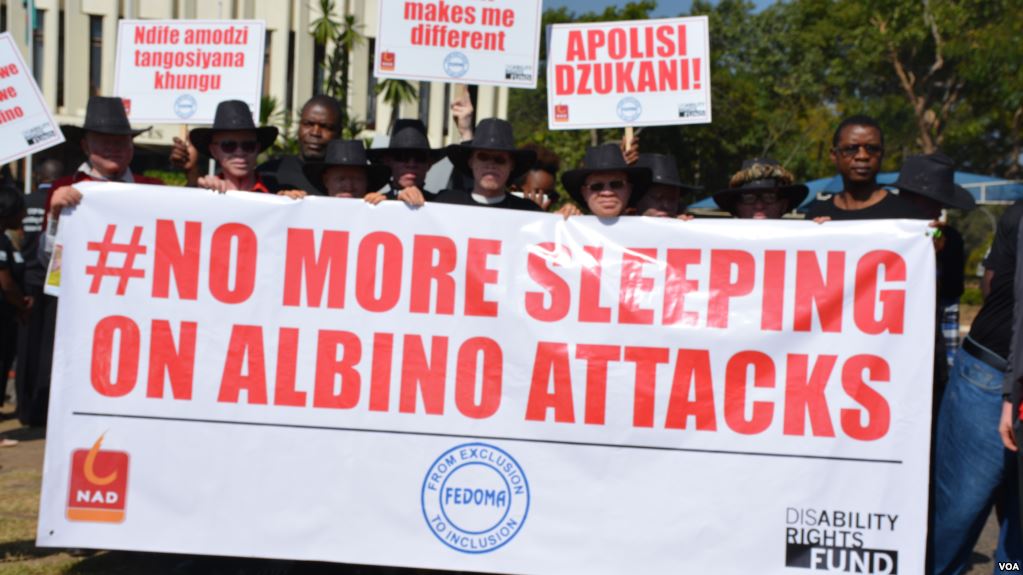Dispelling Africa's myths about albinism

People with albinism have been ‘shunned, ridiculed, tormented, tortured and killed in cold blood’ all over Africa, simply 'on account of the skin colour', Phitalis Were Masakhwe tells Pambazuka News. The biggest threat to persons with albinism, says Masakhwe, is ‘misleading and negative belief systems about the condition’. And when ‘these negative beliefs combine with illiteracy and limited knowledge and facts about the situation, the net result can be calamitous.’
Unless far-reaching, concerted and urgent measures are taken, persons with albinism in Africa face a real threat to their very survival as a people. The killing of a six year-old girl with albinism in Tanzania recently best epitomises the cruelty and danger directed at this group of people by society – in this era and age! The treatment this group of people has received from fellow men and women best depicts intolerance to diversity in its vilest form. Merely on account of their skin colour that makes them easily differentiated, persons with albinism have been shunned, ridiculed, tormented, tortured and killed in cold blood, not only in Tanzania but also in Burundi, Malawi, Mozambique and DR Congo. Going by media reports on the reasons behind the sad state of affairs in those countries, persons with albinism in Kenya, Rwanda, Lesotho, Ghana, Sudan – or any other African state – have every reason to be really worried. Indeed they are a very apprehensive lot!
The utmost threat to people with albinism in most of Africa is misleading and negative belief systems about the condition. When these negative beliefs combine with illiteracy and limited knowledge and facts about the situation, the net result can be calamitous. Some people wrongly believe that those with albinism are a cursed lot. Some believe persons with albinism are terminally ill, weak, cannot hear, and/or are intellectually challenged.
In some cultures, like the Maasai, the ‘albino’ child was traditionally abandoned and left for dead in the wilderness, or left at the doorstep to be trampled upon by cattle because of the attitude that the child who cannot see well cannot take care of cattle or do other communal chores and is therefore useless.
According to Isaac Mwaura of the Albinism Society of Kenya (ASK), ‘It is funny that even in cosmopolitan Nairobi where orientation to human diversity is assumed, there have been weird accounts of people losing their appetite at the mere sight of a person with albinism, associating the condition with disease. Many are people who are convinced that persons with albinism are sterile or barren, that they are immortal, that they are mentally handicapped, or that they can cure HIV/AIDS! Others think that acquiring some body parts of those with albinisms brings good luck and instant riches.’ Now that speaks volumes in a continent where majority are poor and many keep praying for good luck to join the ranks of the rich and powerful!
There is also a gender angle to this issue. Mothers of children with albinism are the primary victims from the misconception that children with albinism are born out of illicit affairs with white men. It is also very common for the mothers to be singularly blamed for the genetic mutation; many women are disowned by their husband and even banished from their communities. Such misplaced family or community tensions do not help matters for children with albinism.
‘Don’t stare, just ask,’ boldly declares the motto of ASK. Tired of the daily stares that meet its membership, the society’s motto is calling on all Kenyans who need to know anything about albinism to ask for more information instead of staring at those with albinism as if they are strange fellows from the moon! Albinism refers to a group of inherited conditions that causes little or no pigmentation in the eyes, skin or hair. It is a genetic mutation that causes a lack of or deficiency in melanin in the body, the photo-protective pigment that protects us from the sun’s harmful ultra-violet rays, resulting in physical characteristics like white or light blond hair, violet to blue eyes and very pale skin that is particularly sensitive to the sun. Without sufficient melanin, our eyes are unable to function properly and the nerve connection to the brain is also altered. Persons with albinism therefore are characterised by long-sleeved clothing, hats and prescription glasses as a measure of protection against the sun.
To preserve and ensure protection and dignified life for children men and women with albinism, robust and extensive awareness and public education programmes particularly at the grassroots’ are sorely called for. Enhanced and diversified media work on the subject, such as In My Genes, a film produced by Lupita Nyong’o, is highly encouraged. Martin Wanyonyi of ASK calls on the government to do more to improve policy and legal environment for Kenyans with albinism: ‘We need a specific law or a review of the Persons with Disability Act 2003 to specifically and expressly recognise and cater for our rights and unique needs such as skin cancer, ritual killings and discrimination in employment, education and healthcare.’
Courtesy of Hon. Eugene Wamalwa and responding to a petition from ASK, Kenyan parliament recently discussed this agenda. The petition to the august house also called for a special code to help identify and count persons with albinism for targeted planning. There is also need to waive duty on sunscreen used by persons with albinism to protect them from the sun.
President Kikwete of Tanzania has shown great leadership on the issue not only through regular advocacy but he has equally appointed a woman with albinism as nominated member of parliament to give enhanced visibility to the cause. How I wish other leaders could emulate the Tanzanian leader.
* Phitalis Were Masakhwe is a sociologist.He has a physical disability.
* Please send comments to [email protected] or comment online at Pambazuka News.
